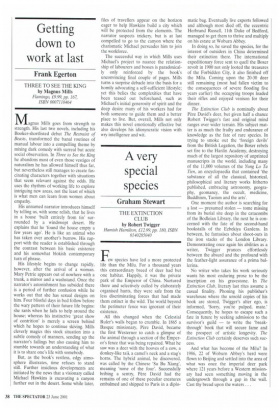Getting down to work at last
Frank Egerton
THREE TO SEE THE KING by Magnus Mills Flamingo, £9.99, pp. 167, ISBN 0007110464 Magnus Mills goes from strength to s rength. His last two novels, including his Booker-shortlisted debut The Restraint of Beasts, transformed the banal routines of manual labour into a compelling theme by mixing dark comedy with surreal but acute social observation. In Three to See the King he abandons most of even those vestiges of naturalism he has allowed himself thus far, but nevertheless still manages to create fascinating characters together with situations that seem relevant against the odds. He uses the rhythms of working life to explore intriguing new areas, not the least of which is what men can learn from women about empathy.
His unnamed narrator introduces himself by telling us, with some relish, that he lives in a house 'built entirely from tin' surrounded by a windswept desert. He explains that he 'found the house empty a few years ago'. He is like an animal who has taken over another's burrow. His rapport with the reader is established through the contrast between his basic existence and his somewhat blokish contemporary turn of phrase.
His lifestyle begins to change rapidly, however, after the arrival of a woman. Mary Petrie appears out of nowhere with a trunk, a mirror and a washstand. Once the narrator's astonishment has subsided there is a period of further confusion while he works out that she has sexual designs on him. Four blissful days in bed follow before the wary pattern of their future life begins: she rants when he fails to help around the house; whereas his instinctive 'great show of contrition' is merely a screen behind which he hopes to continue skiving. Mills cleverly magics this stock situation into a subtle comedy of manners, sending up the narrator's failings but also causing him to stumble towards an understanding of what it is to share one's life with somebody.
But, as the book's restless, edgy atmosphere illustrates, time refuses to stand still. Further insidious developments are initiated by the news that a visionary called Michael Hawkins is excavating a canyon further out in the desert. Some while later, files of travellers appear on the horizon eager to help Hawkins build a city which will be protected from the elements. The narrator suspects trickery, but is at last compelled to go to the canyon where the charismatic Michael persuades him to join the workforce.
The successful way in which Mills uses Michael's project to nuance the relationship of labourers and bosses is paradoxically only reinforced by the book's unconvincing final couple of pages. Mills turns a surprise debacle into the basis for a homily advocating a self-sufficient lifestyle; yet this belies the complexities that have been teased out beforehand, such as Michael's initial generosity of spirit and the deep desire many of his workers had for both someone to guide them and a better place to live. But, overall, Mills not only makes this novel emotionally effective but also develops his idiosyncratic vision with wry intelligence and wit.


































































 Previous page
Previous page